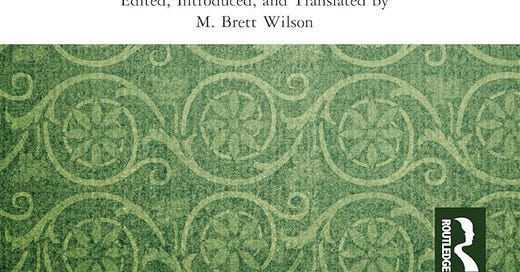Brett Wilson on Yakup Kadri's controversial late Ottoman novel 'Nur Baba'
Brett Wilson on his translation of Yakup Kadri Karaosmanoglu's 1922 novel "Nur Baba" (Routledge), a classic but controversial exploration of religious exploitation, debauchery and even substance abuse
Listen to Turkey Book Talk: Apple Podcasts / Spotify / PodBean / Stitcher / PlayerFM / Listen Notes
Introduce the novel. What is the story and who was Nur Baba?
The story is a tale of spiritual exploration set in the late 19th century. It's one of an elite, well-educated individual who decides to seek spiritual enlightenment and/or an interesting social milieu by visiting a Sufi lodge in Istanbul. In a way, the book is a tale of a somewhat privileged and to some extent Westernised person who explores the "exotic" Eastern things in their own society. For this particular individual, that is a Bektashi Sufi lodge located on the Asian side of Istanbul.
It's worth mentioning the period in which the novel was written, between 1912 and 1921. This was a period when the media in the late Ottoman Empire was growing and was vibrant, and for the first time intellectuals were challenging and criticising religious institutions and figures on many issues. This included imams and mosques, but it also included Sufi lodges. Sufi lodges had been part of the Ottoman Empire for centuries. From the very beginning Sufis, their communities and their lodges played a big role in the settlement and expansion of the Ottoman Empire. Usually Sufi lodges were part and parcel of a newly conquered Ottoman territory. But by the late 19th century and early 20th century, in which all the old institutions were being questioned, Sufi lodges were also included in this. They received a lot of attention from people who said they are dens of perdition, places that teach superstition, where unethical behavior occurs, or types of Islamic practice that aren't justified by mainstream Islam. So we have all these different threads coming together in the novel. This is the first novel that directly criticised and satirised the life of a Sufi lodge. For this reason, among others, it became something of a sensation.
The story begins with a married woman who is living in a mansion (yali) by the Bosphorus. She was from a very prestigious family but her life is a bit gray and dull and too tidy. Through her aunt she begins to hear stories about gatherings, ceremonies and parties that are occurring in a Sufi lodge on the other side of the Bosphorus. This at first is a mere curiosity for her aunt, because she goes to this lodge and is considered to be a kind of outcast in the family. She's spending too much time with morally dubious people in this somewhat ethically dubious place. For this reason, initially, the young woman isn't attracted to it. But over time she becomes more and more fascinated. Eventually, her aunt and other people bring her to the lodge. The story takes off from there. It develops in the way that the woman begins to attend the lodge, becomes a member, and ultimately enters into a long-term romantic relationship with the leader of the lodge, Nur Baba.
Nur Baba is one of the best-known Turkish novels of the early 20th century. It was published in serialised form in the newspaper Aksam in 1921 and was subsequently published as a book in 1922, becoming a sensation. Why did this this novel particularly strike a chord at the time?
Keep reading with a 7-day free trial
Subscribe to Turkey Book Talk to keep reading this post and get 7 days of free access to the full post archives.




